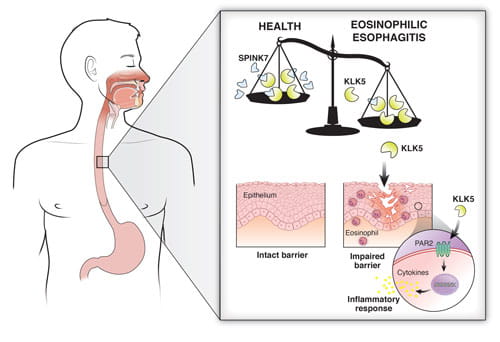Proteases and Protease Inhibitors in Inflammation
The Rothenberg CURED Lab is pursuing the key role of proteases, both within allergens and those produced endogenously, as regulators of allergic responses. Likewise, deficiency of protease inhibitors, such as serine protease inhibitor Kazal-type (SPINK) as a key check point, is being pursued.
Esophageal Allergy as Protease-mediated Disease
An imbalance of specific proteins, proteases and protease inhibitors, in cells lining the esophagus may cause inflammation and tissue damage in people with eosinophilic esophagitis (EoE). In people with active EoE, biopsies of esophageal tissues show a near-complete lack of the protease inhibitor SPINK7, which normally damps down inflammation and helps preserve tissue structure. In this study, researchers of the Azouz Lab and Rothenberg CURED Lab found a missing link that further explains how the process works. SPINK7 normally binds with the protease kallikrein 5 (KLK5), keeping it in check. Without enough SPINK7, KLK5 is free to degrade tissues and start signals leading to inflammation. These findings highlight esophageal allergy as a protease-mediated disease, suggesting that disarming of proteases by delivering protease inhibitors has the potential to be therapeutic in allergic disease.
Current Projects
- Role of protease inhibitors such as SPINK7 and related proteases such as kallikreins (KLKs)




